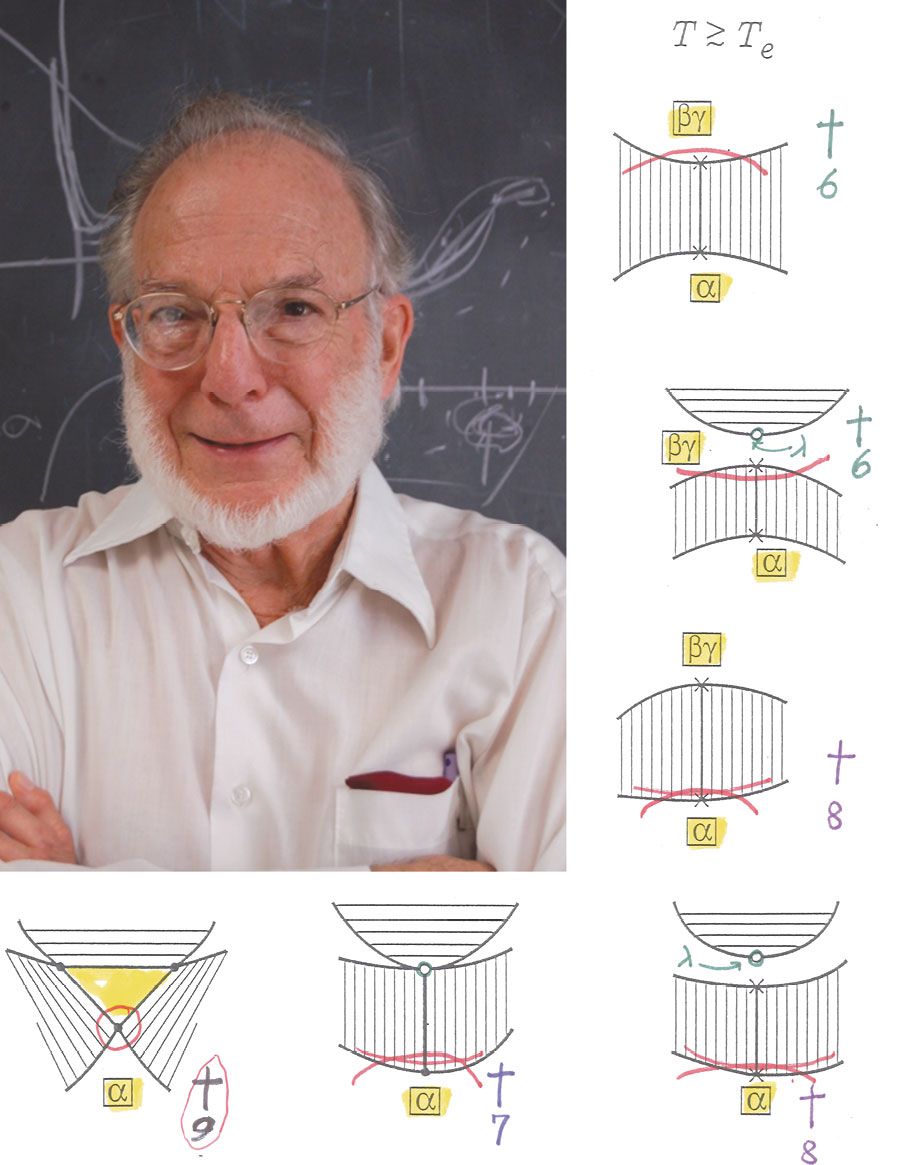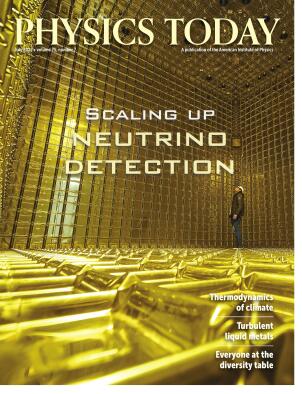Michael Ellis Fisher
DOI: 10.1063/PT.3.5045
Michael Ellis Fisher, a Distinguished University Professor Emeritus at the University of Maryland, was born on 3 September 1931 in Trinidad and Tobago and passed away on 26 November 2021 in Silver Spring, Maryland.

Michael Ellis Fisher
UNIVERSITY OF MARYLAND

A chemist, a physicist, a mathematician, an expert instructor in Spanish (flamenco) guitar, and an amateur artist whose skills spilled over into his expressive slides (see examples at right) and detailed edits, Michael was, in essence, a polymath. His long and productive career in theoretical statistical physics includes an astonishing 400-plus publications. He was a British Royal Air Force officer at a young age and produced his thesis and first publications—regarding analog computers—in that capacity.
Michael received his BS from King’s College London in 1951 and his PhD in 1957 with Donald MacKay. He continued at King’s College to focus on statistical mechanics with collaborator Cyril Domb. Michael held a progression of positions: research fellow, lecturer, reader, and, finally, professor. He moved to Cornell University in 1966 as Horace White Professor of Chemistry, Physics, and Mathematics. Twenty-one years later he went to the University of Maryland. At all those institutions, he had a significant impact.
Michael’s most notable contributions include a number of scientific advances. In an early paper, “Magnetism in one-dimensional systems—the Heisenberg model for infinite spin,” published in the American Journal of Physics in 1964, he presented an exact solution for the phenomenon. That same year his paper “Correlation functions and the critical region of simple fluids” in the Journal of Mathematical Physics introduced the critical exponent η. It is fundamental in critical point scalings as one varies the dimension of the system.
In 1967 Michael extended the droplet or cluster theory of condensation and predicted that there is an essential singularity at the condensation point, suggesting complex possibilities that were the basis for many subsequent studies by others. With Kenneth Wilson in 1972 in Physical Review Letters, he published the groundbreaking paper “Critical exponents in 3.99 dimensions,” which helped Wilson earn the 1982 Nobel Prize in Physics. Michael’s other important works include the 1974 Reviews of Modern Physics article “The renormalization group in the theory of critical behavior.”
As a professor at Cornell and Maryland and at scientific meetings through the years, Michael had a substantial presence. To quote an anonymous source: “He was loved by many and feared by more.” On one occasion, Michael attended a talk on new advances on superfluids given by one of us (Lathrop) and then grad student Gregory Bewley (now a faculty member at Cornell). After the talk, Bewley said, “That went terribly.” Lathrop corrected his observation: “You don’t understand, Greg. We had Michael’s full attention; he likes what he has seen.”
Michael received many awards and accolades. Among them were the 1971 Irving Langmuir Award in Chemical Physics and the 1995 Lars Onsager Prize, both from the American Physical Society; the 1983 Boltzmann Medal of the International Union of Pure and Applied Physics; and a 2005 Royal Medal from the UK’s Royal Society.
With Wilson and Leo Kadanoff, Michael received the Wolf Prize in Physics in 1980. In its citation, the Wolf Foundation described him as “an extraordinarily productive scientist, and one still at the height of his powers and creativity” and said that “Fisher’s major contributions have been in equilibrium statistical mechanics, and have spanned the full range of that subject. He was mainly responsible for bringing together, and teaching a common language to, chemists and physicists working on diverse problems of phase transitions.”
Michael’s mentorship at all levels—K–12 students; undergraduate, graduate, and postgraduate students; and junior and senior faculty members—is difficult to capture here. As a fierce proponent of the scientific method, ethics, and education, he was at times very patient with students and would at other times sharply question colleagues. He gave brilliant advice, and his impact with regard to that and his scholarship was as consistent as his humanity. To quote one mentee: “He invested so well in his students that they now pass along the same messages to those they teach.”
As for his character, Michael was an aggressive questioner and a fierce debater. And he was someone you could trust with your life. Michael Ellis Fisher’s intellectual legacy will echo through the generations in chemistry, mathematics, and physics in ways that are hard to measure.
More about the authors
Daniel P. Lathrop, University of Maryland, College Park.
Ellen D. Williams, University of Maryland, College Park.




